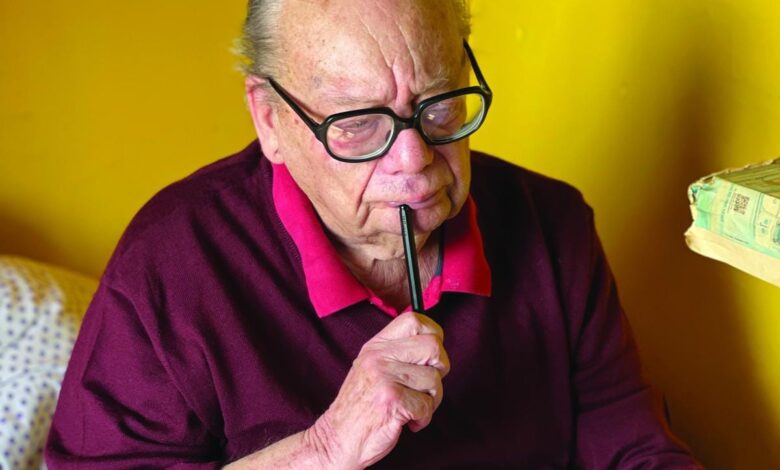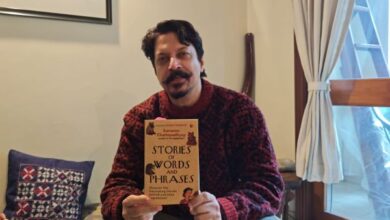
 In the serene hills of Dehradun, where the whispers of the wind tell tales of yesteryears and the rustle of leaves echo the laughter of childhood, we meet Rusty – a boy whose adventures and misadventures alike capture the essence of innocence and the poignant passage into adulthood. Through Rusty’s eyes, we explore a kaleidoscope of emotions – joy, wonder, melancholy, and the relentless curiosity of youth. Welcome to the world of Ruskin Bond’s Rusty, as Bond magically weaves his tales through the magic of his charming and enticing words. Ruskin Bond turned 90 on May 20.
In the serene hills of Dehradun, where the whispers of the wind tell tales of yesteryears and the rustle of leaves echo the laughter of childhood, we meet Rusty – a boy whose adventures and misadventures alike capture the essence of innocence and the poignant passage into adulthood. Through Rusty’s eyes, we explore a kaleidoscope of emotions – joy, wonder, melancholy, and the relentless curiosity of youth. Welcome to the world of Ruskin Bond’s Rusty, as Bond magically weaves his tales through the magic of his charming and enticing words. Ruskin Bond turned 90 on May 20.
Ruskin Bond, a name that resonates with the charm of the Indian hills, the innocence of childhood, and the simple joys of life. His evocative storytelling has captured the imagination of readers, young and old alike, for over seven decades. With a body of work that spans novels, short stories, essays, and poetry, Bond’s literary creations are a treasure trove of wisdom, humour, and a deep love for nature and humanity. His writing, often reflecting his own experiences and observations, transports readers to the serene hills of Mussoorie, the bustling bazaars, and the tranquil life of small towns in India.
It is through these vivid narratives that Bond has etched an indelible mark on Indian literature. A master storyteller, Bond weaves his magic through characters like Rusty or Uncle Ken – and many other interesting characters, sometimes scary – offering us stories that are not just to be read but felt. His writing celebrates life’s simple pleasures and a profound reflection on its inevitable complexities. Each story woven through different characters, is a testament to the timeless beauty of his narratives, resonating with the universal themes of love, friendship, and the eternal bonding with nature.
What Bond does is that he reminds us of our childhood – the dreams we once chased and the memories we continue to cherish. As Jasodhara Banerjee, a Forbes India staff, writes in her article, “A journey into the world of author Ruskin Bond” (October 21, 2016), after her meeting with the author. She says, “Many of the characters he brought to life – Uncle Ken, Rusty, the Four Feathers – have their origins in reality”. “As boys, we were a group of four friends, and we called ourselves the Four Feathers,” Ruskin Bond says. “We thought we were very brave.”
Born to Aubrey Bond and Edith Clarke in 1934, Ruskin Bond, an Anglo-Indian author of the post-Independence era, has vividly depicted Indian life and the marvels of nature for over eight decades. Despite his European heritage, Bond’s works intricately reflect Indian culture, seamlessly integrating his observations and experiences.
An early distressing encounter with nature, involving a bee attack, did not deter his appreciation for flora and fauna. Influenced by works like Ballantyne’s Coral Island and London’s White Fang, Bond’s connection to nature deepened in Mussoorie. In The Book of Nature (2004), he asserts, “Nature doesn’t promise you anything…Nature is a reward in itself.”
Bond’s literary oeuvre is profoundly personal and autobiographical, characterised by a distinctive objectivity and detachment that evoke emotional responses devoid of sentimentalism. Ruskin Bond’s formative years, marred by parental separation; his mother’s remarriage; and his father’s untimely death when Bond was barely ten years old in 1944, indelibly shaped his narrative style. His collections, such as The Man-Eater of Manjari (1974), Time Stops at Shamli (1989), and Our Trees Still Grow in Dehra (1991), present authentic portraits of life, showcasing his artistic brilliance and narrative ingenuity. Bond’s stories frequently revolve around ordinary individuals and everyday occurrences, set against a simplistic backdrop that underscores his deep appreciation for life and nature.
Ruskin Bond, like Wordsworth, views nature as transformative and deeply intertwined with humanity. His stories, especially those for children in Himalayan towns like The Road to Bazaar (1980), highlight carefree childhoods amid nature. Characters enjoy adventures, such as climbing trees and swimming in forest pools. Nature often acts as a protector, as seen in Flames in the Forest and The Adventures of Rusty.
Further, social distinctions are rendered inconsequential, as depicted in ‘The Hidden Pool’, where Laurie, Anil, and Kamal transcend economic and cultural barriers through their shared adventure to the Pindari Glacier.
“They break down economic and cultural fences when they embark on an adventure to the Pindari Glacier. On his return to England, Laurie yearns for the tranquillity of the Himalayas and the hidden pool nestled in its mountains”, writes Himanshu Kumar, Associate Professor, Department of English, Hansraj College, University, in his paper entitled, “Nature and Childhood in Ruskin Bond’s Short Stories”, (Creative Saplings, Vol. 02, No. 08, Nov. 2023).
Prof. Himanshu also mentions, “In the story ‘The Leopard’, it becomes evident that humans should peacefully coexist with nature. The hills’ vibrant plant and animal life easily adapts to the presence of humans without considering it a disturbance”.
Similarly, Paarull Sharma in her paper (read study) on “Relevance of Ruskin Bond’s Stories in the Contemporary World – A Study”, (International Journal of Psychosocial Rehabilitation, Vol. 24, Issue 06, 2020) writes that Bond’s characters are not wholly fictional. Unlike fairy tales that offer escapism, his characters struggle and often fail but remain driven by hope. Bond emphasizes their journey of struggle and resilience, showing true courage as getting back up despite failures, ultimately leading to eventual success.
Amita Aggarwal in the preface to her book ‘The Fictional World of Ruskin Bond’ says, “As an intelligent observer of human life Bond displays the maturity, sophistication and remarkable ease of a storyteller. The characters and incidents spring out of his experiences of daily life. Boy and girl, man and woman, bazaar and shop, hill and plain, the tree and forest – all are close to his observation, to be transformed into some memorable tale”.
Across a seven-decade writing journey, Ruskin Bond penned 500+ short stories and novels, notably ‘Room on the Roof’ and ‘Vagrants in the Valley’. His tales like ‘The Blue Umbrella’, ‘A Flight of Pigeons’, and ‘Susanna’s Seven Husbands’ also inspired Bollywood hits. Films such as Shyam Benegal’s ‘Junoon’ and Vishal Bharadwaj’s ‘The Blue Umbrella’ and popular TV series like ‘Ek Tha Rusty’ attest to his enduring narrative charm.
Bond’s profound grasp of Indian culture, festivals, and nature, coupled with vivid storytelling, marks him as one of the greatest writers of Indian English literature. He has been honoured with the Sahitya Akademi Award (1993), Padma Shri (1999), and Padma Bhushan (2014) for his literary contributions.
The author believes writers don’t retire. And publishers won’t let him either since his stories continue to resonate with readers and viewers alike. Ruskin Bond is not just a literary icon; he is a storyteller who has made the ordinary extraordinary, and in doing so, has become an enduring part of India’s literary heritage.





